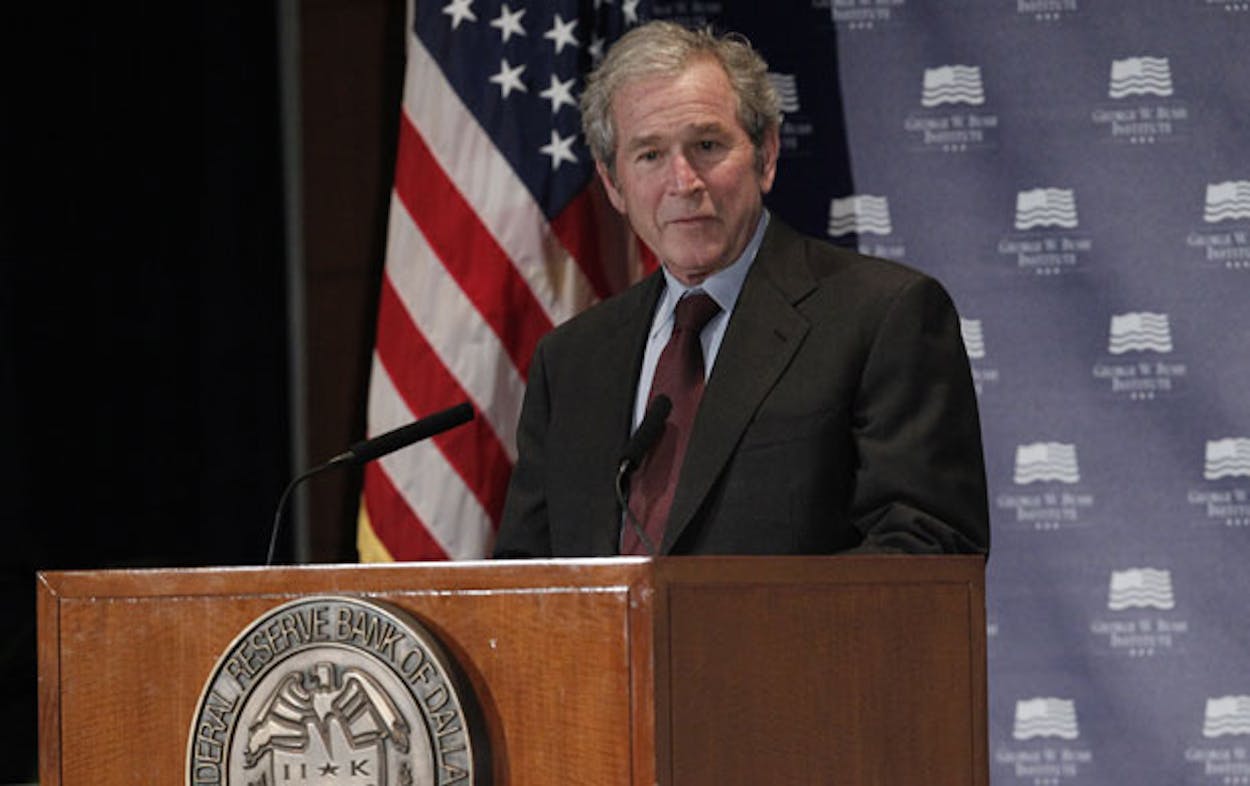Former President George W. Bush trekked from Preston Hollow to the Federal Reserve Bank of Dallas yesterday to urge the country’s leaders to debate immigration reform with a “benevolent spirit.”
Bush, who has rarely waded into the policy arena during his post-presidency, gave a speech that was light on specifics, but contained a warm message that was far from Mitt Romney’s comments on “self-deportation,” and which stressed the economic contributions immigrants make to a society.
“Immigrants come with new skills and new ideas. They fill a critical gap in our labor market. They work hard for a chance for a better life,” Bush said at the conference of his eponymous institute. “Not only do immigrants help build our economy, they invigorate our soul. America can be a lawful society and a welcoming society at the same time.”
What helped shape his views on immigration? His Texan roots, he said: “Growing up here in Texas, like many in this room, I had the honor and privilege of meeting the newly arrived,” Bush said. “Those who I’ve met love their families. They see education as a bright future for their children. Some willingly defend the flag.”
The Texas Tribune‘s Julián Aguilar wrote that Bush’s remarks “appeared to set the tone for the panelists, whose focus was more on reform and its potential boon to the economy and less on law enforcement and border security.”
Tom Benning of the Dallas Morning News noted that this speech had echoes of an Oval Office address that Bush gave in 2007, in which he advocated overhauling the nation’s immigration policies by creating a path to citizenship for those in the country illegally and a guest worker program. So what happened? Well, as Benning reminds readers, “[t]hose efforts were stymied in Congress—partly because of resistance from some of his fellow Republicans, who accused him of pursuing amnesty. Bush has since said one of his regrets was first pushing Social Security reform, rather than immigration reform, after the 2004 election.”
For more specifics on Bush’s current views on immigration reform, the Huffington Post‘s Elise Foley pointed towards The 4 Percent Solution, a book on economic growth published by the Bush Institute in July that contained a portion on immigration reform. As Foley wrote, “Bush Institute executive director James K. Glassman said then that the book emphasizes the need for immigration policy that would ‘attract the smartest people from around the world.'”
With his remarks Tuesday, Bush became the latest in a string of Republican leaders acting upon the perceived necessity of reaching out to Hispanics after some 71 percent of them nation-wide voted for President Barack Obama. “Now, in the wake of a bruising election, Republicans increasingly agree that the party’s hard line on immigration is politically untenable,” Rachel Weiner wrote at the Washington Post.
The Hill‘s Justin Sink provided a good overview of work afoot among Republicans on this issue:
Calls for comprehensive immigration reform have intensified since last month’s election, when President Obama won more than 7 in 10 Hispanic voters. Republicans, including presidential candidate Mitt Romney, partially attributed the president’s strong support among Hispanic voters to his order halting deportation proceedings against some illegal immigrants brought to the United States as children.
Since then, some Republicans have looked to push immigration proposals in Congress. Rep. Lamar Smith (R-Texas) has championed the STEM Jobs Act, which would increase the number of green cards available to foreign-born math and engineering graduates. The Achieve Act, introduced by retiring Sens. Kay Bailey Hutchison (R-Texas) and John Kyl (R-Ariz.) would offer temporary work permits to undocumented workers brought to the United States as children.
Both proposals have thus far received only tepid support on Capitol Hill, but are seen as precursors to a broader immigration reform effort in the next Congress.
- More About:
- Politics & Policy







